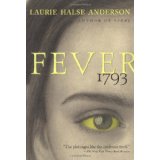 In my practice, I see a lot of really smart kids - it seems to go along with anxiety, for better or for worse. I am struck by how often parents and schools expose smart kids to information beyond their emotional capacity. Kids who are really bright can inadvertently trick us into assuming that they can emotionally process very difficult information. But, a smart nine year old is still.....NINE. An example of this has hit my house these last few weeks. My daughter is a 4th grader, and is in her school's gifted program. It is a wonderful program and we are grateful that it exposes her to like-minded kids who love to learn and to in-depth learning about focused topics - something that is not often done in the regular classroom. This semester's topic, however, has been very challenging. The children are studying the yellow fever epidemic that affected Philadelphia in 1793. Their learning began with a very vivid film that included those affected vomiting black fluid, and a small girl burying her dead mother. Apparently, most of the kids in the class were in tears during this film. When we discussed it at home, it became very clear to me that my very smart daughter thought the people in the film were real. She completely identified with the little girl whose mother died and she felt absolutely devastated for her. She was horrified by the blood, black vomit, and yellowed eyes. I posed her the following question -- "Were there video recorders and TVs in 1793?" A moment of realization came across her face. She said, "Oh mommy, they were ACTORS!" Yes, they were actors. But, did any of the children recognize this? Or, did we grown-ups assume that these super-smart kids "got it" and could process the content like we could? Given how upsetting the film was, I decided to read along with my daughter as they read the book, "Fever 1793" by Laurie Halse Anderson. As a psychologist working with anxious kids, I have to say this book is horrifying. For my adult self, it is very well written, interesting from a historical perspective....but still horrifying. I can't imagine that 9 and 10 year old kids, even gifted ones, can process the idea of half a city dying from a contagious illness; children losing every family member and being orphaned; or a 14 year old having to ward off invaders in her previously safe and loving home. Could the children learn about the yellow fever epidemic in a different way? Sure. They could learn about the immune system and vaccines and how such epidemics can't happen anymore (yes...I know what you're thinking....Ebola, measles, but we are talking to kids here, so let's keep it simple!). They could learn about the racial issues affecting Philadelphia at the time and how they played into this public health crisis. They could learn about what life was like in Philadelphia at this pivotal time and how different factors made the spread of disease so likely (ie., what were bathrooms like, what was the water supply like, where did people get their food from, how hard was it to get out of the city given that there were no cars or trains or taxis)? I am not saying that we shouldn't expose kids to emotion or to difficult topics -- but we need to be mindful of their developmental level and how it might not match up with their scores on tests or on how articulate they are.
0 Comments
Leave a Reply. |
Dr. LedleyI am a licensed psychologist working with kids, teens, and adults with anxiety disorders. Categories |
 RSS Feed
RSS Feed